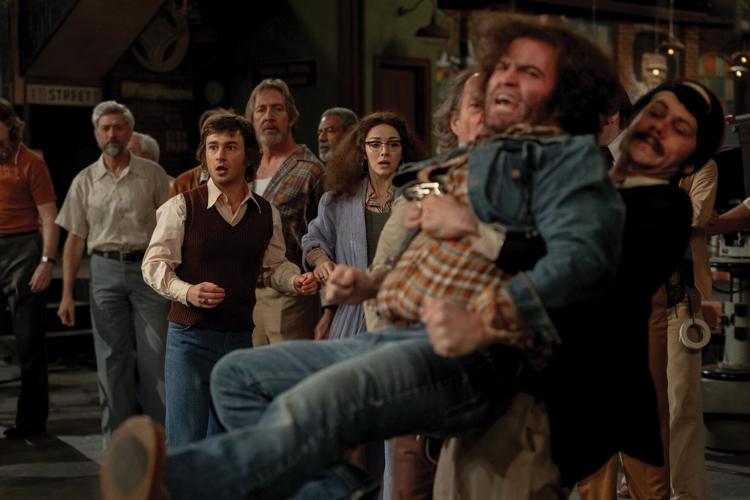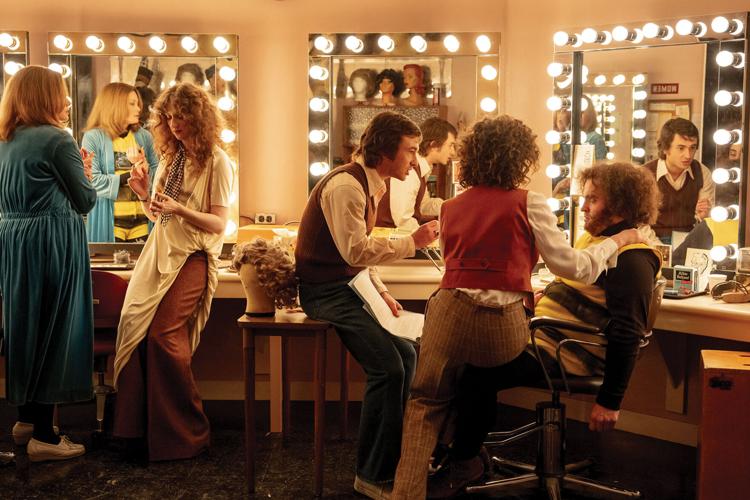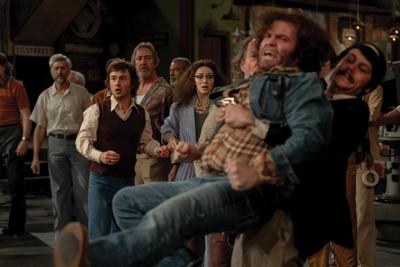“A level of adrenaline typically reserved for fighter pilots and heroin addicts.” That’s how, during a Q&A following a screening of Saturday Night at last month’s Nashville Film Festival, director Jason Reitman described the rush that Saturday Night Live’s cast and crew experience each week. Joined for the Q&A by his casting director John Papsidera and NaFF programming director Lauren Thelen, Reitman also compared Saturday Night to the German film Victoria, the works of filmmaker Michael Ritchie, “Robert Altman on methamphetamines” and Ferris Bueller’s Day Off.
Saturday Night follows then-30-year-old SNL creator and producer Lorne Michaels across 90 real-time minutes on the night his show premieres: Oct. 11, 1975. The film features a stacked cast and a cavalcade of cameos, and Papsidera and Reitman’s casting here is something special. While Saturday Night doesn’t feature a lineup of dead-ringers for the original SNL cast, per se — with the exception of relative unknown Matt Wood, whose resemblance to John Belushi is at times breathtaking — there’s something spiritually true about these performances.
As Michaels, The Fabelmans’ Gabriel LaBelle oscillates between youthful arrogance and the abject panic of a man in over his head. As Garrett Morris, Lamorne Morris (no relation) embodies middle-aged existential crisis, wondering what the hell he, a Juilliard-trained thespian, is doing amid a swarm of white 20-something comedy upstarts. Ella Hunt doesn’t necessarily resemble Gilda Radner all that much, but her warmth pours off the screen. As Episode 1 host George Carlin, Welsh actor Matthew Rhys is unrecognizable and impossibly cool. As both Andy Kaufman and Jim Henson, Succession’s Nicholas “Cousin Greg” Braun is hilarious.
And that’s an assessment that could be applied to most of Reitman’s decisions here: maybe not technically accurate, but spiritually true. Over the course of Saturday Night’s runtime, a whirlwind of technical mishaps, political machinations and moments of kismet befall LaBelle’s Lorne Michaels. The things that happen as the young producer tries to get his show to air — a show that he defends as being avant-garde and cutting-edge, not simply a variety or sketch show — are largely inspired by real-life events. Did Milton Berle (played here deliciously by J.K. Simmons) lurk around 30 Rockefeller Plaza, creeping out the cast? Did Dan Aykroyd (Dylan O’Brien) attempt to hook up with every woman in sight? Did Michaels’ co-producer cousin Neil Levy get too stoned and lock himself away in a room? Yes indeed, a lot of that stuff really did happen. Did it all happen on a single night in 1975? Don’t be ridiculous. The real, the apocryphal, the semi-real and the completely fabricated all come together here in a mosaic that shows us how opening night felt.

Saturday Night
Reitman also noted while in Nashville last month that he considered filming Saturday Night as a single-shot film, though the logistics of that would be nightmarish. Having most recently wrapped 2021’s Ghostbusters: Afterlife and this year’s Ghostbusters: Frozen Empire (he co-wrote both with his Saturday Night co-writer Gil Kenan and directed the former, while Kenan directed the latter), Reitman has proven he can handle big budgets and complicated shoots. A single-shot version of Saturday Night would’ve been an incredible feat, had he managed it, but the film doesn’t suffer without it.
With SNL’s 50th season now underway, it’s fascinating to look back at the galaxy of talent and circumstances that swirled around Michaels as he tried to deliver this mutant show-biz baby. Saturday Night Live, half a century in, is now a known quantity. But on Night 1, everyone — from the adorable Cooper Hoffman as then-freshman NBC exec Dick Ebersol to Willem Dafoe as menacing NBC honcho David Tebet — wanted to know just what the hell kind of show this thing was even supposed to be. It’s a question Michaels dodges until the last possible moment, of course. And most would argue that the answer he finally delivers — which I won’t spoil here — couldn’t be applied nowadays.
But in the film’s final moments, with chaos swirling, and drugs circulating, and the set still being built, and network bigwigs watching dubiously, Michaels’ statement feels spiritually true.







